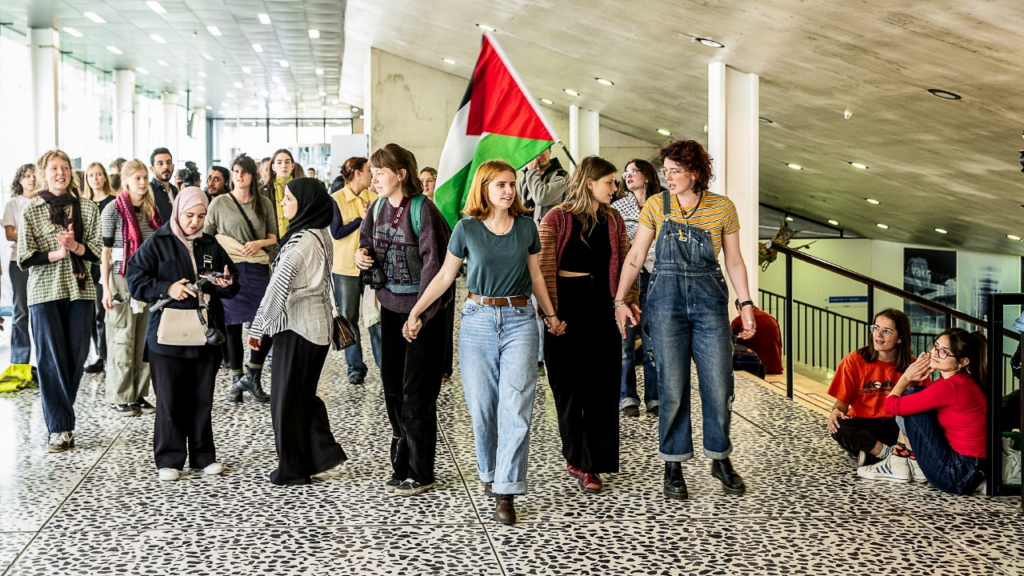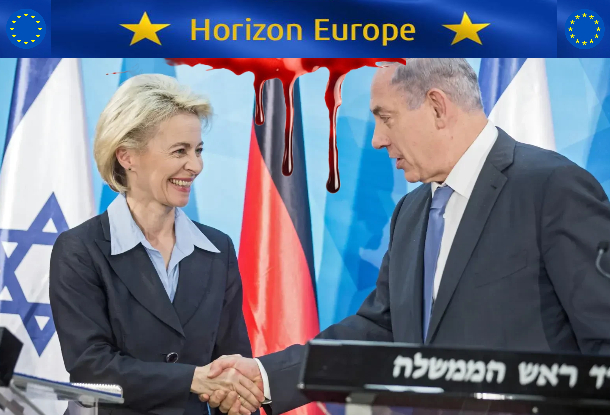Under Project Horizon Europe, Israeli firms and academic institutions participate in various EU-funded research projects. EU politicians and NGOs alike are raising concerns that this funding could bolster Israel’s military power at a moment when the EU is looking at sanctioning Israel for its war crimes in Gaza. More than €1.11 billion from the EU is being paid to 213 Israeli entities involved in 921 ongoing Horizon projects. A thorough investigation conducted by the Belgian outlet L’Echo uncovers the manner in which Horizon Europe funding, which is normally allocated for civilian research and development projects only, is in truth used to bolster Israel’s military-technological complex, whilst enhancing Israel’s military intelligence and cyber capabilities. While the majority of Horizon initiatives are directed towards transparent civilian goals, including medical and biological studies, certain sensitive projects include collaboration with Israeli defense partners who are involved in the Gaza genocide and the ethnic cleansing operation in the Strip. Amongst these collaborations, the investigation reveals collaboration with the IDF, the Ministry of Defense, the Mossad and cyberunits (such as Unit 8200), as well as leading Israeli defense state-owned companies in the light of Rafael Advanced Defense Systems, and Israel Aerospace Industries (IAI).
For instance, in 2020, the European Union (EU) allocated €50,000 to a research and development initiative undertaken by a small Israeli startup known as Xtend. The project’s declared objective is to “integrate cutting-edge drones with augmented, virtual, and mixed reality technologies” to create “new opportunities in fields such as public safety, construction, industrial inspection, and entertainment.” Five years later, the startup has yet to penetrate the domestic drone market or the construction sector. Nevertheless, the company’s aircraft, now referred to as Xtend Defense, play a crucial role in Israel’s military operations in Gaza. The company have assisted the Israeli army in investigating the network of tunnels constructed by the resistance group beneath the enclave, as reported by its CEO in the Wall Street Journal. Millions of EU taxpayers’ dollars have found their way into the heart of Israel’s defence and intelligence apparatus, whose former leader, Yaov Gallant, was issued with an International arrest warrant by the ICC who accused him and Israeli Prime Minister Benjamin Netanyahu of war crime of starvation as a method of warfare; and the crimes against humanity of murder, persecution, and other inhumane acts.
On Wednesday, a draft resolution advocating for an immediate and lasting ceasefire in Gaza did not succeed in the UN Security Council, as the United States exercised its veto, thereby obstructing the initiative supported by all ten elected members of the Council. Europe stands at a pivotal juncture where its institutions are urged to impose stringent penalties on Israel for its continuous assault on the civilian populace in Gaza, the orchestrating of a famine, and its unlawful annexation of Palestinian lands. Financial support from the EU to Israeli organisations should have been discontinued long ago…

IMAGE: Israeli Researchers and Companies Secure Over €1.1 Billion in Horizon Europe Grants, Cementing Global Leadership in Innovation (Source: Israel Innovation Authority)
Lars Bové reports for L’Echo…
European research funds finance Israeli defense
An analysis of 921 ongoing research projects reveals the involvement of the Israeli Ministry of Defense and the provision of European funding to Israeli defense companies.
In October 2024, images captured by an Israeli army drone over the ruins of Gaza quickly went viral. They show Hamas leader Yahya Sinwar, taking refuge on the upper floor of a gutted building, trying in vain to fend off the drone with a stick. Seconds later, the Israeli army pulverised the ruined building, eliminating the leader of the resistance group.
The Israeli manufacturer of this drone had received European funding a few years earlier to develop technology combining real images and virtual elements. At the time, this research project, funded by the EU’s Horizon program, was perceived as purely civilian. Today, however, these drones are used by the Israeli armed forces.
“Analysis of the Cordis database reveals that 921 ongoing projects involve 213 Israeli partners, including five Israeli ministries participating in 21 European Horizon projects.”
Faced with growing outrage over the situation in Gaza, MEPs have been questioning the European Commission for some time now about the involvement of Israeli partners in EU-funded projects. Ekaterina Zakharieva, European Commissioner for Research and Innovation, repeatedly responds that Horizon Europe projects are exclusively civilian in nature, and in accordance with the EC rules. “The actions of the State of Israel cannot be automatically attributed to Israeli entities benefiting from Horizon Europe grants,” she emphasises.
But is this really the case? We discovered that even the Israeli Ministry of Defense is participating in an EU-funded Horizon project. The Cordis database includes 921 ongoing projects involving 213 Israeli partners, including five Israeli ministries participating in 21 Horizon projects. We shared this data with colleagues in France (Le Monde), the Netherlands (FTM), and Germany (Paper Trail Media), who contributed to the analysis.
For example, the Israeli Ministry of Defense is a partner in the Horizon “UnderSec” project, which runs until the end of 2026 and aims to secure underwater infrastructure with sensors and technologies. The Israeli Ministry of Defense is receiving nearly six million euros from the EU for this purpose. In addition to the 100,000 euros allocated to the ministry, nearly half a million euros is earmarked for Rafael Advanced Defense Systems, a state-owned Israeli defense company. Israel Aerospace Industries (IAI), Israel’s largest defense group, is also involved in eight Horizon projects, receiving nearly €2.8 million from the EU.
Mossad Veterans & Co.
Although most Horizon projects have clear civilian objectives, such as medical or biological research, some sensitive projects involve Israeli partners.
One brings together a network of security and intelligence professionals to address cyberattacks. Another is developing infrastructure for urgent drone operations, both medical and non-medical. Yet another focuses on monitoring new communications technologies to combat crime and terrorism.
The coordinators maintain that this is civilian research, even if it has potential military uses, and that the Israeli companies involved have no ties to the military.
“Most of the so-called ‘sensitive’ projects always involve Belgian partners, ranging from companies, think tanks, and research institutions.”
However, in a project focused on counterterrorism innovation, an Israeli consulting firm boasts of working with “the highest-ranking veterans of Israeli intelligence services, such as the Mossad,” and collaborating with the Israeli government. Another project on environmental crime includes an Israeli firm founded by former members of the army’s special units, which has “strong partnerships” with the government.
Vrije University Brussel (VUB) withdraws from a project, Catholic University of Louvain (UCLouvain) remains
Most of these sensitive projects still involve Belgian partners, ranging from companies to think tanks and research institutions. Last year, VUB, a Dutch-speaking university in Brussels, withdrew from an AI project following a negative opinion from its independent ethics committee.
VUB spokesperson Peter Van Rompaey stated that “the participation in military and defense activities by the two Israeli partners was the basis for this decision.” These partners are Bar Ilan University, which received nearly €700,000 from the EU, and Spinedge, a startup spun off from Innofense, an innovation center for Israeli Homeland Security and the Ministry of Defence, which received approximately €600,000.
“UCLouvain had already rejected two other major projects in February, just before the signing, because Israeli partners were participating in and/or supporting fundamental rights violations committed by Israeli forces.” said Céline gransard – Spokesperson for UCLouvain
Despite VUB’s withdrawal, the EU-funded research project Multispin.AI is continuing with Portuguese, Italian, and Czech partners, as well as UCLouvain, which is receiving €677,500 from the EU. UCLouvain spokesperson Céline Gransard explains that the university’s relevant committee has yet to decide on this Horizon project, “which will happen before the summer.” She adds that UCLouvain already rejected two other major projects in February, just before the signing, because Israeli partners “participated in and/or supported fundamental rights violations committed by Israeli forces.”
Big money at stake
However, in January, the VUB joined another Horizon project on 6G network security. It attempted to exclude its Israeli partner, the Holon Institute of Technology. However, the European Commission prevented this, agreeing that there would be no direct exchange between the VUB and Holon. The VUB spokesperson stated that here too, “participation in military activities was the basis” for excluding Holon.

IMAGE: In May of last year, UGent was the scene of a violent student demonstration, expressing their opposition to their university’s collaboration with Israeli partners. (Source: ©BELGA)
Meanwhile, Ghent University in Belgium (UGent) is still collaborating with the Israeli Holon Institute of Technology on another Horizon project on AI-based environmental monitoring systems, which began in 2023 and for which it received nearly €400,000 from the EU. UGent stated that it received a negative opinion on Holon in May of last year, but that the opinion has not yet been implemented because it is “a very slow and tedious process.”
So, there’s a lot of money at stake. More than €1.11 billion from the EU is being paid to 213 Israeli entities involved in 921 ongoing Horizon projects, mainly universities and research institutions. Bar Ilan University, which was particularly targeted by the VUB Ethics Committee, ranks seventh with 44 ongoing Horizon projects, for more than €41 million from the EU.
What is the extent of military collaboration?
To what extent can other Israeli universities be accused of “collaborating” with the IDF? For example, Tel Aviv University, which has the largest number of projects (164, with a total of €230 million from the EU), and the Hebrew University of Jerusalem (149 projects, €189 million from the EU), organize specific study programs or more flexible admission requirements for soldiers (in training).
Ben-Gurion University of the Negev (57 projects, €54 million) explicitly collaborates with the Israel Defense Forces (IDF) and the Hebrew State’x Ministry of Defense on its programs, including scholarships. Some research institutions also reportedly have projects or departments that develop technologies and solutions for the Israeli military and defense companies.
“An academic boycott would undermine the independent and liberal voice in Israel at critical times.”
Technion Israel Institute of Technology
No Israeli university responded to our questions about their possible collaboration with the Israeli army. Only the Technion Israel Institute of Technology (113 projects, €121 million from the EU) responded that “Israeli universities are independent of the government and uphold liberal values” and that “an academic boycott would undermine the independent and liberal voice in Israel at critical times.” However, the Technion openly praises and supports its thousands of students who have already gone to fight for the Israeli army.
From IMEC to Agfa-Gevaert
While the focus is primarily on the collaborations between Belgian universities, there are a total of 223 Horizon projects involving Israeli partners and 219 Belgian entities, representing €230 million in EU funding.
“Agfa had no say in the collaborating parties. Agfa had almost no interaction with the Israeli partner, Technion.” said Viviane Dictus, Spokesperson for Agfa-Gevaert
If we add up the EU funding received by the ten Belgian universities in the ongoing Horizon projects, this represents more than €49 million, with KULeuven and the University of Antwerp (UAntwerpen) as the main beneficiaries. But several million euros of EU funding are also at stake for IMEC and the Flemish Institute for Technological Research (VITO), public institutions such as the Innovation and Entrepreneurship Fund and Sciensano, as well as the Flemish and Walloon Regions.
Among the 219 Belgian entities concerned, we also find Belgian companies such as Agfa-Gevaert and Bekaert, albeit for less than half a million euros in EU funding. The Agfa imaging group emphasises that its project began in 2022, before violence escalated in October 2023 in Israel and the Gaza Strip. “We are not the coordinator or organiser of this project and had no say in the collaborating parties. Agfa has had almost no interaction with the Israeli partner Technion.”
In response to our investigation, European Commissioner Zakharieva stated that she has reviewed or is reviewing the sensitive Horizon projects we identified, but that the Israeli beneficiaries have not yet violated “ethical rules.” Regarding the involvement of the Israeli Ministry of Defense and other defense companies, she now admits that they are not automatically excluded from Horizon projects, as long as they are involved in “exclusively civilian research.”
Meanwhile, 16 new Horizon projects are already underway with Israeli partners, notably around AI and a new generation of sensitive cameras.
Considerable financial stakes
Since 1996, Israel has been a key partner in the EU’s framework programs for research and innovation. This fruitful collaboration has given rise to more than 5,000 joint projects.
The current program, Horizon Europe (2021-2027), has a budget of over €93 billion, succeeding Horizon 2020 (2014-2020), which mobilised nearly €80 billion. Israel, alongside 18 other non-EU countries such as the United Kingdom and Canada, actively participates in Horizon Europe. For European Commissioner Ekaterina Zakharieva, this cooperation is “an undeniable success with mutual benefits,” as she recently emphasised in a parliamentary response.
Nevertheless, the European Commission will now closely examine allegations of human rights violations by Israel in the Gaza Strip. This investigation follows a request from 17 Member States, including Belgium. If these accusations are proven, the Association Agreement with Israel, which also governs research cooperation, could be suspended. Respect for human rights is indeed a sine qua non of this agreement. The ten Belgian universities have already called for its suspension. However, such a decision requires unanimity from all 27 Member States, which seems unlikely given the unwavering support of some of Israel’s allies, such as Hungary and Germany.
The financial stakes are considerable. Our investigation shows that, of the 921 ongoing Horizon projects involving the Jewish state, 443 are exclusively Israeli. These projects, which include AI, cryptography, algorithms, and drone technology, are receiving €791 million in EU funding. This represents 70% of the €1.1 billion in EU funding allocated to Israel under the ongoing Horizon projects.
Furthermore, according to the European Commission, Israel has already contributed nearly €1.7 billion for the period 2021-2025 to participate in Horizon Europe. The financial stakes are therefore very high for both sides.
READ MORE EU NEWS AT: 21st CENTURY WIRE EU FILES
SUPPORT OUR INDEPENDENT MEDIA PLATFORM – BECOME A MEMBER @21WIRE.TV
VISIT OUR TELEGRAM CHANNEL
Click this link for the original source of this article.
Author: Global Affairs
This content is courtesy of, and owned and copyrighted by, https://21stcenturywire.com and its author. This content is made available by use of the public RSS feed offered by the host site and is used for educational purposes only. If you are the author or represent the host site and would like this content removed now and in the future, please contact USSANews.com using the email address in the Contact page found in the website menu.








